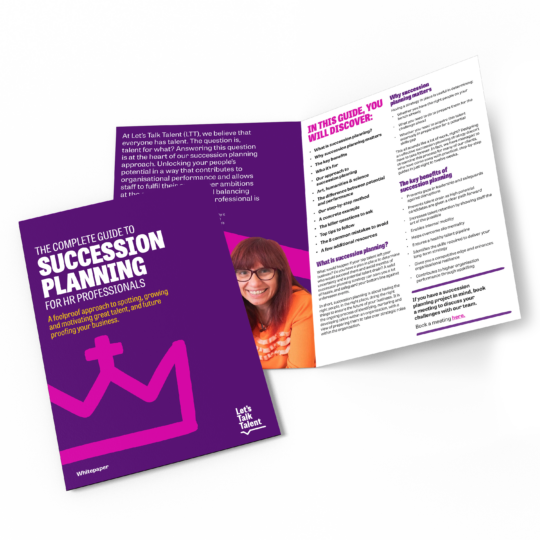Why you should expand your succession plans to include more than your leadership team
Got a succession plan in place for your business? That’s great. But if it only covers your C-Suite, it’s only a starting point. The current state of the employment market is creating some key gaps in many organisations’ plans as specialists are being courted (and often snatched away) by competitors, leaving unfilled roles and resulting in businesses losing crucial knowledge and expertise. It has become evident that employers rely on specialists just as much as they rely on their General Managers (GMs), and the departure of one of your experts can be just as disruptive as that of a senior executive. Specialists are behind product launches, new innovations, thought leadership, research and much more. They are your legal experts, financial team and HR professionals as much as your data scientists. In short, everything that can give you an edge over your competitors. So how can businesses ensure they are prepared and can set next steps in motion when it comes to planning the succession of their key specialists? Here’s how.
What is a specialist? And why should you focus on them?
Early in their careers, most people have to make a decision on whether to become specialists or generalists. Generalists usually go on to manage or lead teams, or even join the organisation’s C-Suite. Their training focuses on soft skills such as emotional intelligence, change management or effective leadership as well as commercial skills. Specialists, on the other hand, usually stick to one area of expertise, which can sometimes limit their promotion prospects. As such, they often have limited or expensive training and development opportunities, as opposed to high potential generalists, tagged for leadership positions. This can lead to specialists not feeling valued or having very few options when it comes to challenging themselves and propelling their careers forward. But employers are now learning that not granting specialists the same level of focus and attention as they do aspiring leaders can be a costly mistake. Especially in a market geared up towards recruiting generalists, with specialists becoming much harder to find (and attract). So how can you safeguard your organisation and ensure your specialists feel appreciated, challenged and motivated? That’s where succession planning comes in.
3 questions to ask to kickstart succession planning for specialists
Succession planning is about having the right people in the right roles, doing the right things to deliver your long-term strategy. And when it comes to this particular equation, not all roles are created equal. Step one of your journey should be identifying the positions, skills, traits and attributes you require in order to survive and thrive as a business. This map should include specialist roles within each business unit. Once those are mapped out, ask yourself:
- Question 1: How can we ensure this person feels valued and remains with us?
As mentioned, it is much harder to recruit specialists than it is to keep them, so ensuring they stay with you should be your first priority.
- Question 2: What will we do should this person decide to move on?
Bear in mind that when a specialist does leave, it can be just as disruptive as when senior leaders exit the business.
- Question 3: Are there other members of the organisation who could fill those gaps? Which tools would they need to be in a position to step up to the plate?
Specialists can take years to train, so ask yourself whether or not you can afford to wait until someone leaves before you start filling future skills gaps.
4 top tips on how to prepare a succession plan for your expert roles
The easiest way to futureproof your organisation? To retain your current experts, and to ensure your business is an attractive place of work for future candidates who may be considering putting you on their shortlist of potential employers. Here’s how to do it.
Once you’ve identified your key specialist roles, break those down into tasks and look for new ways to enhance the employee experience for your valued employees. How could you show them they are an important part of the organisation? Generate motivation? Provide them with opportunities for growth?
- Give them the freedom to focus on what they do best. Remove the parts of their role that have become irritants. Are there lengthy admin processes slowing down their progress? Paperwork? Unnecessary red tape? Could this be modified, improved or streamlined?
- Appeal to their intellectual prowess. Allow them to focus on innovation and find ways to cultivate a growth mindset. For example, could you provide data scientists with regular opportunities to collaborate with your product managers in order to spark new ideas or generate high energy?
- Reward and recognise them in the same way you would a future leader. Ensure your pay package is competitive and that they have the same opportunities for reward and recognition as other high potential candidates within the business.
- Make their career path more attractive. What this looks like in practice will vary from business to business, from department to department and from job to job. This step requires getting to know your people and understanding what makes them tick. This could be anything from attending conferences on new technology, to having opportunities to give speeches, to lead new projects or to showcase their work across the organisation. Whatever it is, do not assume they know their career or training requirements more than you do and just leave them to it. Get involved and make them feel valued.
Conclusion: How to retain your specialists with succession planning and forethought
When it comes down to it, succession planning for specialist roles isn’t any more complex than it is for any senior leadership or C-Suite position within your organisation. But it is just as crucial.
Make sure you review your succession planning strategy to include all the specialist skills your business requires to keep functioning without any disruption to its operational strategy. Once those roles, skills and people have been identified, get started with both continuously growing their expertise and making them feel like the invaluable part of your organisational community that they are. And as a bonus, having a clear focus on specialist roles will in turn facilitate recruitment for the next generation of experts, giving you an advantage as an employer in an employee’s market.
If you’d like to know more about succession planning, download our free predictive succession planning whitepaper here or book a meeting with one of our team directly. We’d be happy to talk.

